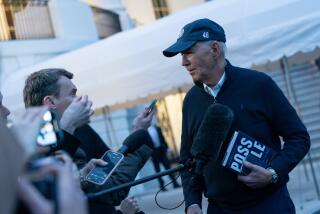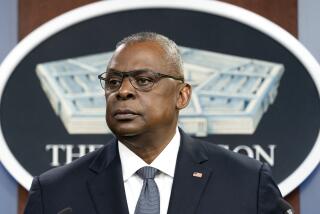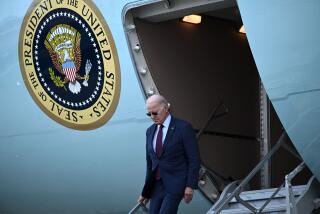Why can’t Obama run the government as smoothly as his campaign?
WASHINGTON — A year after his reelection triumph, President Obama is facing an awkward question from friends and foes alike: Why can’t he run the government as well as he ran his campaign?
What with the IRS targeting of tea party groups; the poor security at the U.S. mission in Benghazi, Libya; the eavesdropping on close allies; and the botched rollout of the landmark healthcare law, Obama increasingly seems to be battling top-level management failures as much as policy or political problems.
On each of these controversies, Obama has claimed ignorance before the fact and outrage afterward, leaving even some Democrats to see him as asleep at the wheel.
“There’s a sort of distance in his style,” said Elaine C. Kamarck, who led the Clinton administration’s government reform effort and now is at the nonpartisan Brookings Institution. “On the one hand, he’s not getting into terrible details like [President] Carter did. But on the other hand, it comes back to bite him because he seems to not know a lot of stuff that’s going on.”
That perception is growing. In public opinion surveys, Obama’s job performance numbers have dropped sharply this year. One poll last week showed his approval down to 42%, a rate comparable to that of President George W. Bush after the horrors of Hurricane Katrina in 2005.
PHOTOS: The battle over Obamacare
Although unpredictable crises often upend presidents’ second terms, some of Obama’s worst problems seem self-inflicted.
The iPad-toting president who promised high-tech efficiency in government — even appointing the first chief performance officer, chief technology officer and team of innovation fellows at the White House — has launched his only major domestic policy program with a website that almost feels like a clunky relic from the dial-up age.
“They had a tech-savvy campaign, but that has very little to do with running a tech-savvy government because the presidency really doesn’t run in a management way,” said William Daley, Obama’s chief of staff from January 2011 to January 2012.
“The one kind of surprising thing, since this was the signature” domestic program, Daley said, “and for four years everybody knew this was a complicated, difficult thing to do, that there wasn’t a heavier kind of skepticism around the process.... Can the federal government bite off such an enormous thing?”
The underlying premise of the Obama presidency was an affirmative answer to that question. As a candidate, he vowed to restore government competence to earn back trust, and to make a case for expanding the government’s role in people’s lives.
“We simply cannot afford to perpetuate a system in Washington where politicians and bureaucrats make decisions behind closed doors, with little accountability for the consequences … and where outdated technology and information systems undermine efficiency, threaten our security and fail to serve an engaged citizenry,” Obama said in 2009 as he named Jeffrey Zients, a former corporate chief executive, as chief performance officer, a new title that borrowed from corporate culture.
PHOTOS: 2013’s memorable political moments
If the name is familiar, that’s because Obama tapped Zients again last month, calling him in to consult on the effort to fix the healthcare.gov website.
But Obama did not sustain the zeal for good management, Kamarck said. Initiatives that leaned heavily on updating technology, consumer-friendly interaction and trimming inefficiencies rarely got top billing at the White House.
He hardly discussed his attempt to scale back outside contracting, for example, disappointing those who called for reform. His effort to reorganize Commerce Department agencies that deal with small business stalled when it met resistance in Congress.
In 2012, Zients was named acting chief of the Office of Management and Budget. His previous duties, ensuring the government was setting and achieving performance goals, were shifted to another official. When a new chief performance officer was nominated in September, the post was announced via a news release with a list of nominees.
Inconsistency at the top is part of the problem, said Bob Stone, project director of the Clinton-era government reform effort, which was led by then-Vice President Al Gore. Gore devoted time every day to the project and stayed in close contact with agency heads.
In one of those meetings, during the federal government shutdowns in the mid-1990s, Gore learned that the Justice Department had furloughed its procurement staff, leaving no one to order food at federal prisons. The problem was fixed on the spot, Stone said.
“It seems to be that this White House has no chain to the top, even just the conventional ‘protect the boss’ standard that ought to be in place everywhere,” Stone said. “When something is about to burst, you warn the boss. That’s both a management issue and a political issue.”
PHOTOS: Team Obama, where are they now?
He added, “It’s hard to see that the president has really had any interest in actually managing the government.”
White House spokesman Jay Carney on Friday disputed that claim.
When it comes to U.S. eavesdropping on friendly foreign leaders including German Chancellor Angela Merkel, Carney said, the president is a “deliberate consumer” of intelligence reports. But he said Obama was focused on security threats that “keep him up at night,” not a close ally’s phone calls.
On the healthcare rollout, Carney said, the president did not know the website wasn’t fully functional before it was launched Oct. 1.
“The president expects results,” Carney said. “That’s the way he manages this White House. That’s the way he manages this administration. He believes that smart people ought to bring all their talents to bear to solving problems, but he expects results.”
Some past presidents learned the hard way that the mundane work of management can prove crucial.
Bush’s popularity never recovered from his slow response to Katrina’s devastation on the Gulf Coast. Carter’s reelection in 1980 was doomed by his handling of the Iran hostage crisis, when militants seized the U.S. Embassy in Tehran in 1979 and held 52 American diplomats for 444 days.
“In both those cases, management issues became the point of no return,” Kamarck said.
kathleen.hennessey@latimes.com
More to Read
Start your day right
Sign up for Essential California for news, features and recommendations from the L.A. Times and beyond in your inbox six days a week.
You may occasionally receive promotional content from the Los Angeles Times.








